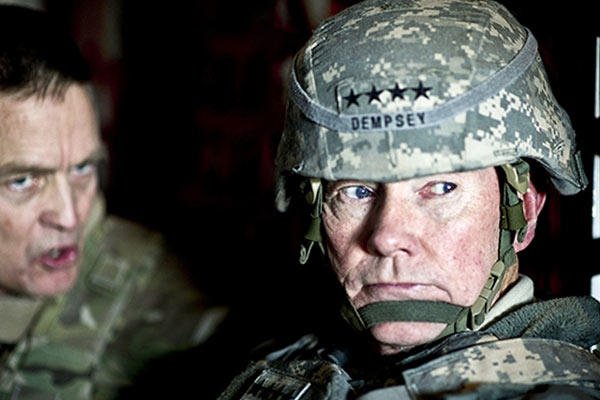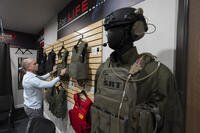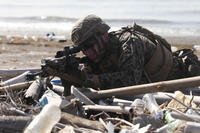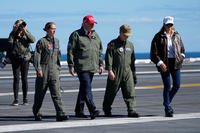Gen. Martin Dempsey said Wednesday that the chaotic situation on the ground and a loss of confidence in the Iraqi government would make it tough to execute immediate U.S. airstrikes to combat the Islamic extremists of the Islamic State of Iraq and Syria (ISIS).
"We have a request from the Iraqi government for air power," Dempsey said, but his advice to President Obama would be to hold off "until we can clarify this intelligence picture."
Dempsey, the chairman of the Joint Chiefs of Staff, said the U.S. was flying piloted surveillance aircraft and reconnaissance drones over Iraq to gauge potential targets and develop a better assessment of the ISIS threat.
"We have a great deal of ISR (intelligence, surveillance and reconnaissance) assets committed," Dempsey said. "We've maneuvered a great deal of both manned and unmanned ISR," said Dempsey.
The intelligence picture that has emerged is that of an Iraqi army that has fled ahead of ISIS attacks. Dempsey said that two Iraqi divisions and a national police unit "did in fact throw down their arms" as ISIS attacked in pickup trucks. The Iraqi troops "simply lost faith" in the Baghdad government, Dempsey said.
Dempsey quickly added that the situation in Iraq "has not broken down entirely on sectarian lines," with ISIS drawing support from the Sunni population while Shia militias rally behind the central government.
Dempsey said there were still "multi-confessional" units of the Iraqi army who appeared to be holding ground against ISIS north of Baghdad.
Obama was meeting at the White House later Wednesday with leaders of the House and Senate on possible military options in Iraq after moving the aircraft carrier George H.W. Bush into the Persian Gulf and sending up to 275 U.S. troops to the region to bolster security at the U.S. embassy in Baghdad.
Last week, Obama said that Iraqi Prime Minister Nouri al-Maliki would first have to reconcile with the estranged Sunni population of Iraq before the U.S. would take military action.
U.S. support "has to be joined by a serious and sincere effort by Iraq's leaders to set aside sectarian differences," Obama said.
In testimony before the Senate Appropriations Committee, both Dempsey and Defense Secretary Chuck Hagel said that Obama's conditions were not being met by Maliki.
"There is very little that could've been done to overcome the degree to which the government of Iraq has failed its people," Dempsey said.
"This government in Iraq has never fulfilled the commitments made to form a unity government" with representation for the Shia, Sunni and Kurdish communities, Hagel said. "We can't dictate outcomes. It's up to the Iraqi people."
Dempsey, who was in charge of training the Iraqi army and police from 2005-2007, said he went to Baghdad last year to plead the case for unity and against a return to sectarianism but was rebuffed.
"I would describe the response as a volume of conspiracy theories," Dempsey said.
He said he found the Iraqi military plagued by constant changes in leadership and "all forms of sectarianism."
Sen. Dianne Feinstein, D-California, a member of the Appropriations Committee and chairwoman of the Senate Intelligence Committee, told Dempsey and Hagel that "the Maliki government has got to go if we're going to have any reconciliation."
Dempsey said he identified with the "bitter disappointment" of Iraq veterans who are now watching cities they fought to liberate fall to ISIS extremists.
However, "the men and women who served in Iraq did exactly what was asked of them" and the blame lies with "Iraq's leaders who failed to unite," Dempsey said.
Hagel took exception to Sen. Lindsey Graham, R-South Carolina, who said that the total U.S. withdrawal in 2011 led to the current crisis.
"We didn't lose anything," Hagel said. "It wasn't the U.S. that lost anything. We have done everything we could to help them," Hagel said of the Iraqis.
Sen. Dan Coats, R-Indiana, questioned whether Afghanistan might be overrun by the Taliban when U.S. troops withdraw.
"I can't completely convince myself or you that that couldn't happen," Dempsey said, but added that the Afghan National Security Forces trained by the U.S. "are far better fighters, far more tenacious fighters than the Iraqis."
In Iraq, "we could train them to fight, equip them to fight," Dempsey said.
"The hardest thing of all is to build leaders and have them supported" by the Iraqi government, he said.
In Iraq Wednesday, the chief military spokesman, Lt. Gen. Qassim al-Moussawi, claimed that Iraqi forces had repelled ISIS fighters who tried to take over the nation's largest oil refinery in the northern town of Baiji, the Associated Press reported.
However, other reports said that ISIS forces were still fighting and gaining control of the refinery.
In Baghdad, Maliki went on national TV to rally support against ISIS and warned the Sunni regimes in neighboring countries that they could be next.
"They will flee to you and your countries will also be inflamed with sectarian wars," Maliki said, without naming nations he considered at risk. Maliki's government earlier this week charged that Saudi Arabia was providing "moral and material support" to ISIS.
-- Richard Sisk can be reached at richard.sisk@monster.com




























